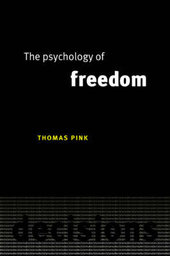
|
The Psychology of Freedom
Paperback / softback
Main Details
| Title |
The Psychology of Freedom
|
| Authors and Contributors |
By (author) Thomas Pink
|
| Physical Properties |
| Format:Paperback / softback | | Pages:296 | | Dimensions(mm): Height 227,Width 151 |
|
| Category/Genre | Ethics and moral philosophy |
|---|
| ISBN/Barcode |
9780521038225
|
| Classifications | Dewey:123.5 |
|---|
| Audience | | Professional & Vocational | |
|---|
| Illustrations |
2 Tables, unspecified
|
|
Publishing Details |
| Publisher |
Cambridge University Press
|
| Imprint |
Cambridge University Press
|
| Publication Date |
26 July 2007 |
| Publication Country |
United Kingdom
|
Description
This 1996 book presents an alternative theory of the will - of our capacity for decision making. The book argues that taking a decision to act is something we do, and do freely - as much an action as the actions which our decisions explain - and that our freedom of action depends on this capacity for free decision-making. But decision-making is no ordinary action. Decisions to act also have a special executive function, that of ensuring the rationality of the further actions which they explain. This executive function makes decision-making an action importantly unlike any other, with its own distinctive rationality. Pink's highly persuasive study uses this theory of the will to provide accounts of freedom, action and rational choice. The author argues that, in a tradition that runs from Hobbes to Davidson and Frankfurt, Anglo-American philosophy has misrepresented the common-sense psychology of our freedom and action - a psychology which this book now presents and defends.
Reviews"Pink's writing is complex, yet clear and crisp. He explains his theory of the will with precision and depth. His overall strategy is coherent and his argumentation is sophisticated." Clifford Williams, Philosophy in Review "...an original and interesting book. Pink...offers a comprehensive, unified theory of a number of phenomena. His work should promote inquiry into some central (and some neglected) issues concerning freedom, action, decision, and practical rationality." Randolph Clarke, The Philosophical Review
|